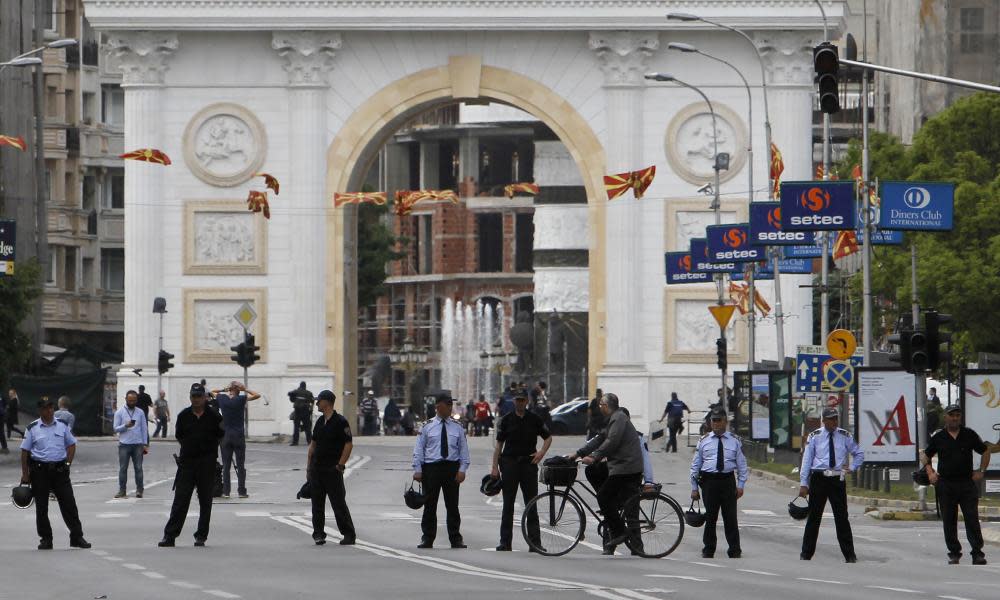EU and Nato plead for calm in Macedonia after protest at parliament

The EU and Nato have pleaded for calm in Macedonia after nationalist protesters stormed the parliament in Skopje on Thursday, attacking politicians and journalists in an attempt to prevent the election of an ethnic Albanian as speaker.
The protesters, supporters of former prime minister Nikola Gruevski’s conservative, Russia-backed VMRO party, demanded new elections.
Russia claimed the EU’s rapid show of support for the attacked MPs showed western powers were determined to bring Macedonia and other Balkan states into their orbit.
The interior minister, Agim Nuhiu, offered to resign over the breach of security that left senior Social Democrat MPs, including opposition leader Zoran Zaev, bloodied, and Macedonia’s fragile reputation as a democratic country under question.
In a joint statement the EU’s foreign policy chief, Federica Mogherini, and the European commissioner, Johannes Hahn, said: “We condemn in the strongest terms today’s ongoing attacks on the members of the parliament in Skopje. The acts of violence in the parliament are wholly unacceptable and we call for calm and restraint.”
“The interior ministry and the police must ensure the security of the parliament and its members,” they said.
The Nato secretary general, Jens Stoltenberg, said he was shocked by the violence. “All parties should respect democratic process and engage in dialogue, not violence,” he urged on Twitter.
Protesters, some wearing hoods to disguise their identity, forced their way into the parliament after the vote to elect Talat Xhaferi as speaker.
The vote was supposed to mark an important step in the establishment of a new opposition-led coalition government in Macedonia, which has been without a government since December, when Gruevski’s VMRO party won elections, but without enough votes to form an administration. Coalition talks broke down over ethnic Albanian demands that Albanian be recognised as an official second language in a country where a quarter of the population is ethnic Albanian.
The Social Democrats have forged a working parliamentary majority with Albanian nationalist parties, even though the VMRO is the largest parliamentary party.
The VMRO party, which has been trying to avoid losing power by preventing the election of a new speaker for more than a month, said Thursday’s election was unlawful and an “attempted coup”. The US said in the lead-up the vote was in line with the rules of the Macedonian parliament.
The VMRO-backed president, Gjorge Ivanov, on Friday joined the calls for calm and tried to convene a leaders meeting to discuss the crisis, but the Social Democrats boycotted the meeting, saying the president had been instrumental in the failed efforts to block the vote on the speaker going ahead. The Social Democrats are now determined to press ahead with the formation of their coalition government.
Thursday’s violence marked a dramatic escalation in a political crisis that has been simmering since an December’s inconclusive parliamentary election, which was meant to relieve tension after leaked wiretaps appeared to reveal widespread illegal surveillance and corruption orchestrated by the long-ruling VMRO.
The VMRO regards the alliance between the Social Democrats and Albanian parties, including a commitment to upgrade the status of the Albanian language, as a threat to the independence and integrity of Macedonia. In practice Macedonian politics have seen coalitions formed with Albanian parties before.
The Social Democrats say the leaders of the old government know they face corruption charges, and so are desperate to cling to power. Russia claimed the Social Democrats were willing to spill blood in the streets of Macedonia as part of a project to create a Greater Albania.
Albanians make up about a quarter of the population of Macedonia and are seeking greater official use of Albanian as well as a fairer distribution of national resources to the regions.
An interior ministry statement on Friday said 102 people had been treated at city hospitals, including MPs and police officers, after Thursday night’s violence.
Hungary’s foreign minister claimed foreign intrusion was to blame for the political crisis in Macedonia.
Peter Szijjarto says that far-away foreign countries, which he didn’t name, decided the country’s voting timetable. Szijjarto, attending a meeting of EU foreign ministers in Malta, said: “Macedonia’s example clearly shows the dangers of external intervention in the life of a country.”
The Serbian government called an emergency session saying the episode in the Skopje parliament raised questions of security right across the Balkans.

 Yahoo News
Yahoo News 
